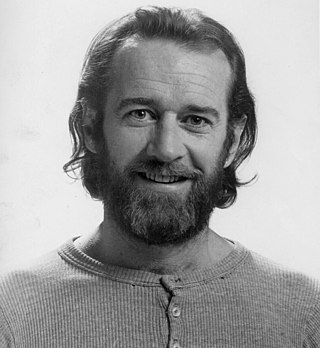Roe v. Wade, 410 U.S. 113 (1973), was a landmark decision of the U.S. Supreme Court in which the Court ruled that the Constitution of the United States protected a right to have an abortion. The decision struck down many abortion laws, and it sparked an ongoing abortion debate in the United States about whether, or to what extent, abortion should be legal, who should decide the legality of abortion, and what the role of moral and religious views in the political sphere should be. The decision also shaped debate concerning which methods the Supreme Court should use in constitutional adjudication.

George Denis Patrick Carlin was an American stand-up comedian, social critic, actor, narrator, and author. Regarded as one of the most important and influential comedians of all time, he was dubbed "the dean of counterculture comedians". He was known for his dark comedy and reflections on politics, the English language, psychology, religion and taboo subjects.

In the United States, abortion is a divisive issue in politics and culture wars, though a majority of Americans support access to abortion. Abortion laws vary widely from state to state.

The March for Life is an annual rally and march against the practice and legality of abortion, held in Washington, D.C., either on or around the anniversary of Roe v. Wade, a decision legalizing abortion nationwide which was issued in 1973 by the United States Supreme Court. The participants in the march have advocated the overturning of Roe v. Wade, which happened at the end of the case Dobbs v. Jackson Women's Health Organization on June 24, 2022. It is a major gathering of the anti-abortion movement in the United States and it is organized by the March for Life Education and Defense Fund.
Abortion in Oklahoma is illegal unless the abortion is necessary to save the life of a pregnant individual.
Abortion in Georgia is illegal after detection of embryonic cardiac-cell activity, which typically begins in the fifth or sixth week after the onset of the last menstrual period (LMP), two to three weeks after implantation. Although this law was ruled unconstitutional by a Georgia superior court judge on September 30, 2024, it remains in effect while the state appeals the ruling.
Abortion in Illinois is legal up to the point of fetal viability. Laws about abortion dated to the early 1800s in Illinois; the first criminal penalties related to abortion were imposed in 1827, and abortion itself became illegal in 1867. As hospitals set up barriers in the 1950s, the number of therapeutic abortions declined. Following Roe v. Wade in 1973, Illinois passed a number of restrictions on abortion, many of which have subsequently been repealed. Illinois updated its existing abortion laws in June 2019. The state has seen a decline in the number of abortion clinics over the years, going from 58 in 1982 to 47 in 1992 to 24 in 2014.
Abortion in Delaware is legal up to the point of fetal viability. As of June 2024, Civiqs polling found that 72% of Delawareans believed that abortion should be legal in all or most cases, while 23% believed it should be illegal in all or most cases. There was a therapeutic exceptions in the state's legislative ban on abortions by 1900. Informed consent laws were on the books by 2007. In 2017, Senator Bryan Townsend, D-Newark introduced legislation to try to make clear that abortion would remain legal in the state in case 1973's Roe v. Wade ruling was overturned. The legislation was subsequently updated. Attempts have been made to introduce mandatory ultrasound laws, but they failed to get out of committee. State legislators tried to move ahead the week at which a woman could get a legal abortion in 2019.
Abortion in the District of Columbia is legal at all stages of pregnancy. In 1971, in United States v. Vuitch, the U.S. Supreme Court upheld a law saying abortion was allowed for health reasons, which include "psychological and physical well-being". Consequently, the District of Columbia became a destination for women seeking abortions starting that year.
Abortion in Idaho is illegal from fertilization. Following the overturning of Roe v. Wade on June 24, 2022, abortion in Idaho was criminalized by the trigger law which states that a person who performs an abortion may face two to five years of imprisonment. The ban allows exceptions for maternal health, rape and incest within the first trimester. The law took effect on August 25, 2022.
Abortion in Kansas is legal. Kansas law allows for an abortion up to 20 weeks post-fertilization. After that point, only in cases of life or severely compromised physical health may an abortion be performed, with this limit set on the belief that a fetus can feel pain after that point in the pregnancy. In July 2024, the Kansas Supreme Court struck down two abortion restrictions.
Abortion in Massachusetts is legal, although terminations after the 24th week can only be performed if a physician determines it to be medically necessary. Modern Massachusetts is considered to be one of the most pro-abortion rights states in the country; a 2014 Pew Research poll found that 74% of residents supported the right to an abortion in all or most cases, a higher percentage than any other state in 2014. Marches supporting abortion rights took place as part of the #StoptheBans movement in May 2019. The 2023 American Values Atlas reported that, in their most recent survey, 78% of people from Massachusetts said that abortion should be legal in all or most cases.
Abortion in New Jersey is legal at all stages of pregnancy. Abortion related laws were drafted by the legislature by the end of the 1900s. These laws would be addressed in court during the 1800s as they related to application in prosecutions of people who could become pregnant for having abortions. During the 1940s, hospitals created committees to approve abortion requests, with the goal of trying to reduce the number of abortions performed at them. Currently, there are no required waiting times, and parental consent is not required.
Abortion in South Carolina is illegal after detection of a "fetal heartbeat", usually around 6 weeks from the woman's last menstrual period, when many women are not yet aware that they are pregnant. On May 25, 2023, Governor Henry McMaster signed a 6-week ban, and it took effect immediately. The ban was indefinitely blocked in court on May 26, and reinstated by the South Carolina Supreme Court on August 23.
Abortion in Tennessee is illegal from fertilization except to "prevent the death of the pregnant woman or to prevent serious risk of substantial and irreversible impairment of a major bodily function of the pregnant woman". Tennessee is one of four states which prohibit abortion in their state constitution; alongside Alabama, Louisiana, and West Virginia.
Abortion in West Virginia is illegal except in cases of rape or incest, fatal fetal abnormalities, and when the mother’s life is at risk from a pregnancy.
Abortion in Wisconsin has been legal since September 18, 2023, and is performed in Madison, Milwaukee and Sheboygan through 22 weeks gestation. However, elective abortions in Wisconsin are under dispute after the overturning of Roe v. Wade by the Supreme Court of the United States on June 24, 2022. Abortion opponents cite an 1849 law that they claim bans the procedure in all cases except when the life of the mother is in danger. However, lower level courts have argued that the law only applies to infanticide and not consensual abortions. The enforceability of the law is disputed and being considered by the state courts. Planned Parenthood of Wisconsin announced that they would resume abortion services in Madison and Milwaukee on September 18, 2023. Planned Parenthood of Wisconsin later announced that they would resume abortion services in Sheboygan on December 28, 2023.
Abortion in California is legal up to the point of fetal viability. An abortion ban was in place by 1900, and by 1950, it was a criminal offense for a woman to have an abortion. In 1962, the American Law Institute published their model penal code, as it applied to abortions, with three circumstances where they believed a physician could justifiably perform an abortion, and California adopted a version of this code. In 2002, the California State Legislature passed a law guaranteeing women the right to have an abortion "prior to viability of the fetus, or when the abortion is necessary to protect the life or health of the woman". In 2022, 67% of California voters approved Proposition 1, which amended the Constitution of California to explicitly protect the right to abortion and contraception.
Dobbs v. Jackson Women's Health Organization, 597 U.S. 215 (2022), is a landmark decision of the U.S. Supreme Court in which the court held that the Constitution of the United States does not confer a right to abortion. The court's decision overruled both Roe v. Wade (1973) and Planned Parenthood v. Casey (1992), returning to the federal and state legislatures the power to regulate any aspect of abortion not protected by federal statutory law.

A series of ongoing protests supporting abortion rights and anti-abortion counter-protests began in the United States on May 2, 2022, following the leak of a draft majority opinion for the U.S. Supreme Court case Dobbs v. Jackson Women's Health Organization, which stated that the Constitution of the United States does not confer any reproductive rights, thus overturning Roe v. Wade and Planned Parenthood v. Casey. On June 24, 2022, the Supreme Court officially overturned Roe and Casey in Dobbs, resulting in further protests outside of the U.S. Supreme Court building and across the country, eventually to major cities across the world both in favor of and against the decision.




